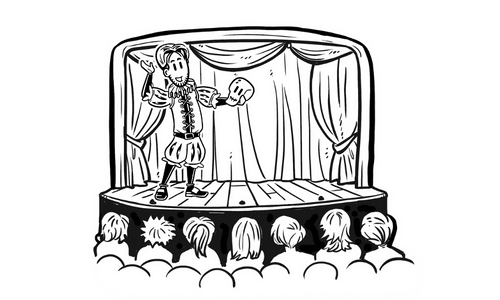Macbeth, a lesson in understanding your audience…
I took a trip to the cinema this week to see Macbeth, and it got me thinking how easy it can be at times to become so lost in your own showcase that you almost completely forget about who’s watching. I’d find it hard to recommend Macbeth, not because it isn’t a good film, but because it’s a great one. It’s so faithful to the source material, and so relentless in its tone, that it’s both spot-on and potentially too obtuse for the wider audience.
We stumble across this scenario almost every day at simpleshow. Our clients come to us with a complex topic, and are usually so invested in the topic themselves that in the process of trying to explain it, they do a pretty good job of alienating their audience and making the message almost impossible to digest. We allude to this problem in our whitepaper on the 5 rules to explain something simply.
It’s all about maintaining some perspective!
Shakespeare was a master of prose more than he was of storytelling, so it was refreshing to watch an adaptation of his that actually makes use of his writing; the dialogue is lifted straight from the source. First of all, this means that the film is actually worth making at all (Macbeth is hardly the most complicated story nor has it not received enough attention already) but secondly, it actually recreates the very tone the original intended. However, it might be hard for some audiences to feel particularly engaged as a result. And we all know that the end goal of almost anything we say is to engage at least one member of our intended audience, from swashbuckling blockbusters like Macbeth, to the most boring of corporate PowerPoints – nobody wants a disengaged audience!
But sometime it’s just very easy to forget who the intended audience really are, and why they should be listening to you in the first place. It’s a bit like an IT Manager telling all of his non-IT co-workers how they should go about using their newly installed learning management system (LMS), doing so only in boring IT jargon. As Simon Sinek brilliantly puts it, you should always focus on the “WHY”, not just “What” or “How”.
The only criticism I can really throw at the film Macbeth though is that, due to a lengthier play being shortened to just two hours, a couple of important moments feel rushed. Without spoiling the story (though you’ve had since 1611 to catch up) Lady Macbeth’s famous story arc feels very brushed over; one moment she’s feeling guilty via monologue and the next that arc is over.
Perhaps for newcomers this won’t have too much of an impact, but I suspect it will still jar a little. And it’s the same for our IT laypersons; if you don’t first explain to them (in simple, non-Shakespearian English) why they should switch to this new system, then they won’t play ball. By changing perspective for a second and really thinking through the “What’s in it for them” issue, you can build a natural arc to a compelling storyline that will work wonders as an explanation.
So, is Macbeth worth seeing? Well despite saying it’s hard to recommend, I do so heartily. The language may be dense and you might be very aware of exactly how uncomfortable you are in your cinema seat, but you’ll walk away knowing that this was a very, very good film.
